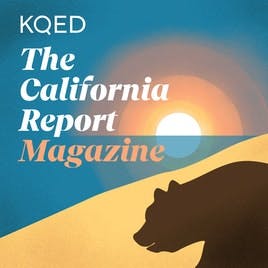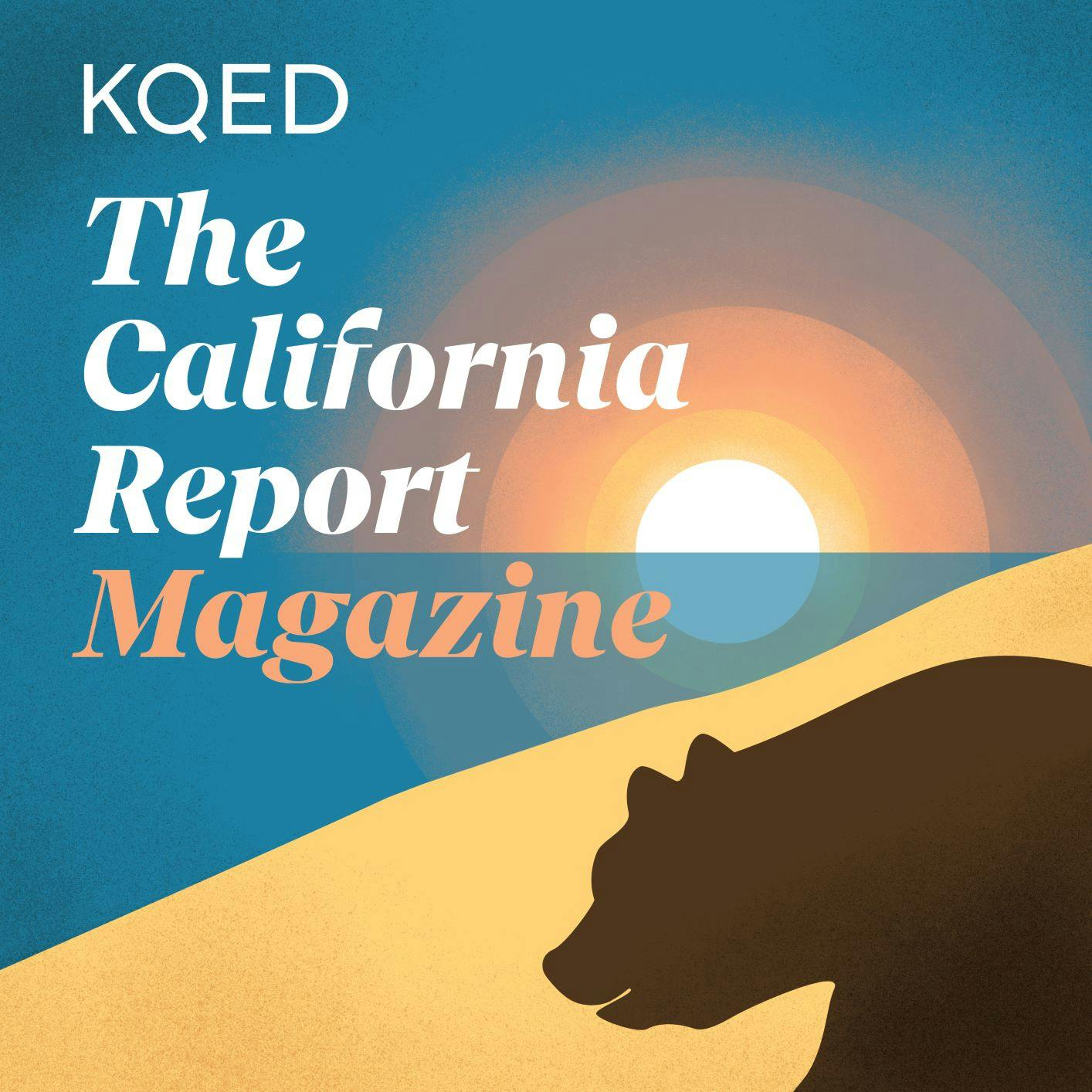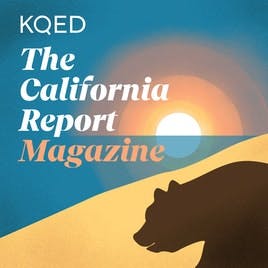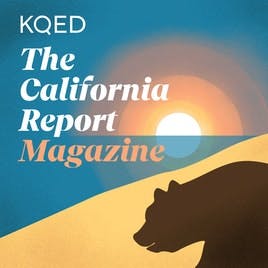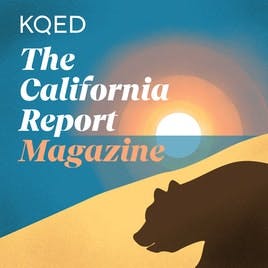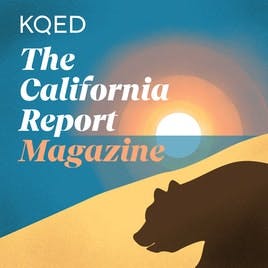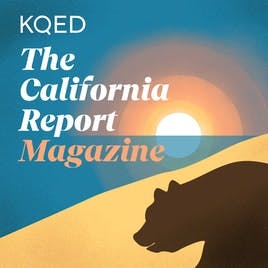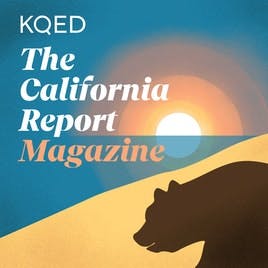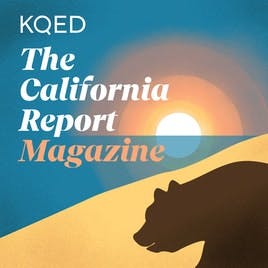Discover The California Report Magazine
The California Report Magazine

The California Report Magazine
Author: KQED
Subscribed: 409Played: 17,521Subscribe
Share
Copyright © 2019 KQED Inc. All Rights Reserved.
Description
Every week, The California Report Magazine takes you on a road trip for the ears: to visit the places and meet the people who make California unique. The in-depth storytelling podcast from the California Report.
352 Episodes
Reverse
Back in the early 1900s, the burgeoning city of Los Angeles needed water, and the Owens Valley—more than 200 miles northeast—had plenty of it. Today, about a third of LA’s water supply comes from the Owens Valley and other parts of the Eastern Sierra. But the city got that water at the expense of the Nüümü people, who have been working to get it back ever since. This week, reporter Teresa Cotsirilos from the Food and Environment Reporting Network brings us the story of one tribal elder's fight to reclaim these water rights for his community.
Learn more about your ad choices. Visit megaphone.fm/adchoices
California's Central Coast is the ancestral homeland of indigenous California tribes including the Chumash and Salinan peoples. For years, the Northern Chumash have been working to create a new marine sanctuary. If the federal government approves that designation this summer, California would be home to the first national marine sanctuary nominated by, and named after, an indigenous tribe. It’s the culmination of decades of tribal conservation work. And, as reporter Benjamin Purper tells us, it’s also the legacy of a father and daughter.
Later, we talk to professional rock climber Beth Rodden who has conquered some of the most treacherous climbs in the world. She was the first woman to complete two routes up Yosemite's famous El Capitan, with no gear helping to pull her up. But despite her success, she’s battled raging self-doubt and multiple injuries. Rodden spoke to KQED's Bianca Taylor about her new memoir, A Light Through the Cracks: A Climber's Story.
Finally, we're revisiting a story from our Hidden Gems series about an old-school Los Angeles diner called Dinah’s, which closed its doors at the end of April. A developer bought the restaurant site and announced ambitious plans for new construction. Dinah’s is reopening as a new kind of restaurant in Culver City, but it’s the end of an era for the diner that’s been serving customers for more than six decades in the same location near the LA airport. Sasha Khokha takes us there.
Learn more about your ad choices. Visit megaphone.fm/adchoices
Famous for showcasing transgender performers for more than a quarter century, AsiaSF, the beloved San Francisco restaurant and club, closed its doors this week. Reporter Wilma Consul went to one of the final shows at AsiaSF, and tells us how the groundbreaking venue became a place where people from all over the world could find joy and authenticity.
And, California has had a state flower and state animal for awhile now, but this year we finally got an official state mushroom. KQED's Danielle Venton takes us foraging to try to find the Golden Chanterelle.
Finally, we head to Fresno County, where a group of farmworkers living in a mobile home park did something that might seem impossible in a time of rising housing costs: They bought the park from their corporate landlords. The California Report’s Madi Bolanos tells us how they did it.
Learn more about your ad choices. Visit megaphone.fm/adchoices
We're in your feeds a little early this week, but for good reason: We're giving you a little peek behind the scenes! You'll be meeting some of the people who make The California Report Magazine, and we'll take you through the process of how a story gets made. If you like what you hear, please consider visiting donate.kqed.org/podcast and supporting the work we do at KQED. Thanks.
Learn more about your ad choices. Visit megaphone.fm/adchoices
It's Youth Takeover week here at KQED, a time when we hand the mics over to local high school students. This year, we hear from teens at Fremont High School in in East Oakland. They talk about the challenges they face right now and tell us why they feel so misunderstood.
And we visit the San Fernando Valley, where high school seniors have taken over one of the most anticipated rights of passage: prom. LAist's Mariana Dale discovered a program at Sylmar Charter High School where students don’t just choose the theme and set up decorations: they actually grow and arrange the flowers for the big event.
Plus, why doesn't California have more school buses? How kids get to and from school is a big part of the school experience for many kids. But if you’ve been looking closely you may have noticed there aren’t as many school buses as there are in other states. Katrina Schwartz, who’s a producer with KQED’s Bay Curious podcast, set out to figure out why.
Learn more about your ad choices. Visit megaphone.fm/adchoices
After escaping genocide in Cambodia, Phoeun You’s family settled in Long Beach. But after being bullied as a teen, You joined a gang. He ended up shooting and killing a teenager. You served 25 years in California prisons and tried to turn his life around while he was behind bars. He thought he'd gotten that chance when he was granted parole, but upon release, he was deported to a country he had never really known. Producer Mateo Schimpf brings us his story.
Learn more about your ad choices. Visit megaphone.fm/adchoices
Within months of the attack on Pearl Harbor in December 1941, as more than 100,000 Japanese Americans were being sent to incarceration camps, other ethnic groups also became the target of new wartime security measures. Italian citizens living near California’s coastline and military sites — some 10,000 of them — were forced to leave their homes and find somewhere else to live. It was just one of many government measures meant to protect the West Coast from an enemy invasion that never came. Reporter Pauline Bartolone brings us this story from the Bay Curious podcast.
Plus, we look at the labor behind reality television. From blind dates to tiny homes, the genre has exploded in recent years But some workers say the success of the industry hasn't translated into stability for people behind the scenes. Guest host Bianca Taylor talks to KCRW's Megan Jamerson, who's talked to some reality TV workers who say they’re being overworked and underpaid.
Learn more about your ad choices. Visit megaphone.fm/adchoices
As journalists, we don’t often tell our own stories. We separate ourselves from the issues we cover. But sometimes, the story hits close to home. This week, we’re featuring a story from Erin Baldassari, KQED’s Senior Editor for Housing Affordability. Growing up in California's Sierra Nevada foothills, wildfire has always been part of her consciousness. Her earliest memory is fleeing a fire as it bore down on her childhood home. As she and her family consider moving back, she wanted to learn how people there are adapting to the rising risk of wildfires due to climate change.
Erin’s story comes to us from the KQED podcast, Sold Out: Rethinking Housing in America.
Learn more about your ad choices. Visit megaphone.fm/adchoices
Proposition 8 's Lessons for One Queer Journalist
In November 2008, California voters passed Proposition 8, taking away the right to marry from same-sex couples. But two years later, two same-sex couples sued the State of California in federal court. Prop 8 was eventually overturned. That landmark trial was videotaped, but the recordings were never released to the public. Until a few years ago, when KQED sued for access to the tapes and won. The U.S. Supreme Court allowed them to be unsealed in October 2022. KQED’s community engagement reporter Carlos Cabrera Lomeli, spent hours watching those tapes. As a queer journalist covering California’s gay marriage journey, Carlos says he learned a lot about himself in the process.
Plus, we head to Santa Cruz where Judi Oyama first learned to ride a skateboard in the 1970s. Today, 50 years into a groundbreaking career, she's considered of the best skateboarders in the nation. In fact, Judi recently qualified to race at the World Skate Games in Rome this fall. At 64, she says she’s the fastest she’s ever been. KAZU’s Erin Malsbury brings us her story.
Learn more about your ad choices. Visit megaphone.fm/adchoices
Today Palm Springs is known for mid-century modern architecture and queer-friendly culture. But a new documentary on PBS's Independent Lens explores the history of racist housing practices in the city that effectively hid a black neigborhood behind a wall of trees. “Racist Trees” covers the fight to remove those trees decades after they were planted, and asks the question: 'Who takes responsibility for the wrongdoing of the past?' Directors Sara Newens and Mina T. Son join Sasha Khokha to talk about the film.
Plus we visit San Francisco's Prelinger Library, a treasure trove of ephemera from books of soil samples to zines. In the 1990s, libraries started to become digital and began clearing out their catalogs. A network of like-minded librarians brought the “discards” to Rick and Megan Prelinger’s attention. The husband and wife, already collectors of print and text items, opened their library in 2004 and say 'it's available to any and everyone who believes our past can pave a path to a better future.'
Learn more about your ad choices. Visit megaphone.fm/adchoices
Nine months into Satsuki Ina’s parents’ marriage, Pearl Harbor was bombed. Their life was totally upended when, along with 125,000 other Japanese-Americans, they were sent to incarceration camps. After unsuccessfully fighting for their civil rights to be restored, they renounced their American citizenship. That meant the US government branded them as “enemy aliens.” Ina was born in a prison camp at Tule Lake, but didn’t know much about that difficult chapter in her parents’ life. Then she discovered a trove of letters that they sent to each other while they were separated in different camps. Now, at close to 80 years old, Ina – who spent most of her career as a trauma therapist — is publishing a memoir about how her parents’ relationship survived prison camps, resistance and separation. Using letters, diary entries, haikus written by her father, and photographs, The Poet and the Silk Girl is a rare first-person account of a generation-altering period in Japanese-American history. Sasha Khokha sat down with Satsuki Ina to learn more about her parents’ story and how it shaped the course of Ina’s own life.
Learn more about your ad choices. Visit megaphone.fm/adchoices
When Oscar season rolls around, everyone’s trying to catch up on the blockbuster films. But there’s rarely buzz about the short films, especially the short documentary category. This year, two joyful California films made the nominee list. Nǎi Nai and Wài Pó is a love letter from Fremont-raised filmmaker Sean Wang to his two grandmothers, 94 year old Nǎi Nai and 83 year old Wài Pó. They are in-laws turned best friends who spend their days together, even sharing a bed. The Last Repair Shop tells the remarkable stories of the people behind the scenes who fix instruments for students learning music in LA Unified School district. Sasha Khokha talks to Sean Wang as well as Kris Bowers and Ben Proudfoot, the co-directors behind The Last Repair Shop, about their films.
Learn more about your ad choices. Visit megaphone.fm/adchoices
When correctional officer Valentino Rodriguez first stepped behind prison walls, he wasn’t just starting a job, he was joining a brotherhood. What he didn’t know was that he was now bound by an unwritten code that would ultimately test his loyalty to his oath and his fellow officers. Valentino’s sudden death on October 21, 2020 would raise questions from the FBI, his family and his mentor in the elite investigative unit where they both worked. For more than two years, our colleagues with KQED’s investigative podcast On Our Watch have been looking into what happened to Valentino Rodriguez, because his story is part of something much bigger. He was a correctional officer at New Folsom prison, near Sacramento, where the reporting team has found use of force that’s off the charts, and a pattern of suspicious beatings. This week we bring you an excerpt from the first episode of the series.
Learn more about your ad choices. Visit megaphone.fm/adchoices
In many California cities, freeways and sprawl are just a fact of life. They’re baked into the design of much of the state. But how did we get here? Just how did freeways come to be such a big part of California life?
This week, we’re featuring a story from our friends at the KPBS podcast Freeway Exit. Host and producer Andrew Bowen looks at how our relationship with the freeway has changed over time, and how it will have to change in the future.
Learn more about your ad choices. Visit megaphone.fm/adchoices
How The Bay Area’s Biggest City Wants to Overcome Its Sprawl
The cars and trucks we drive account for nearly half of California’s total carbon emissions. And bringing those emissions down is going to require more than just swapping out gas guzzling cars for electric ones. It’s going to mean redesigning our cities around people, not cars. KQED’s Adhiti Bandlamudi takes us to San Jose where local leaders are trying to rethink how residents live and how they get around. This story comes to us from KQED’s podcast Sold Out: Rethinking Housing in America.
LA’s Bé Ù Puts a New Spin on Vietnamese Takeout, and Workers’ Rights
Many chefs will tell you their cooking reflects the food they grew up eating. Food shared on holidays or at family parties. For our series Flavor Profile, The California Report’s Keith Mizuguchi introduces us to a chef cooking up Vietnamese comfort food inspired by her family’s recipes. She’s also a former union organizer trying to build a business where workers are paid a fair wage.
Learn more about your ad choices. Visit megaphone.fm/adchoices
This week, we feature stories from our Hidden Gems series about out-of-the-way secret spots in California - places you might want to visit on a road trip!
How This Oakland Business Gives Mannequins New Life (Almost)
You might not notice them, but mannequins can be found everywhere from the tiniest boutiques to Target. But what happens to these non-biodegradable figures when stores go out of business or styles change? In California, many of them end up at Mannequin Madness, an Oakland warehouse run by a woman whose mission is to keep mannequins out of the landfill.
This Stretch of the Mojave Desert Plays the ‘Lone Ranger’ Theme
There’s a road in the western Mojave Desert that’s supposed to sound like the "William Tell Overture" by Rossini. Honda built the road back in 2008 as part of a TV commercial for the Civic. But it's seen better days. Reporter Clare Wiley headed out to Lancaster to make some music with her tires.
Fort Bragg’s Larry Spring Museum Preserves Creativity in California
The tiny Larry Spring Museum is dedicated to a Mendocino County TV repairman who lived in Fort Bragg most of his life. He was an amateur physicist, a keen observer of nature and the items he left behind reveal his deep curiosity about the world. KQED’s Katrina Schwartz takes us to this whimsical museum to learn more about the man behind it.
Learn more about your ad choices. Visit megaphone.fm/adchoices
Roughly a quarter of California’s carbon emissions come from our buildings and the energy that powers them. And we need to cut those emissions down to next to nothing to avoid the scary effects of climate change. Making a home green is pretty easy if you start from scratch. But it gets a whole lot harder when it comes to converting the millions of homes in California that already exist. The ones where most of us live. Climate reporter Laura Klivans takes us to East Oakland, where one city block is taking a revolutionary approach to reducing their emissions: by electrifying together, all at once. This story comes to us from KQED’s podcast Sold Out: Rethinking Housing In America.
And it's been just over a year since the mass shooting at two mushroom farms in Half Moon Bay killed seven farmworkers, all of whom were immigrants from China and Mexico. One nonprofit has been providing survivors and the farmworker community with mental health support including a music therapy class. KQED’s Blanca Torres brings us this story.
Learn more about your ad choices. Visit megaphone.fm/adchoices
On the northern end of Stockton, you'll find Angel Cruz Park. Most weekends it's lined with food vendors, many of them Hmong and Cambodian immigrants. For more than 30 years, this has been a destination for made-to-order dishes, where locals argue over who has the best beef sticks or papaya salad. For her series California Foodways, Lisa Morehouse spent a day at the park, learning about the people behind the food.
Next we got to the Sacramento-San Joaquin Delta. The area is known for farming, boating and fishing. And it’s got some new migrants: Artists from cities. Reporter Jon Kalish wondered how these urban newcomers are fitting into life in the rural Delta and what an influx of creatives has meant for the community. He talked to transplants who were challenged when they became part of the community.
And finally, more than half of people in the US choose to be cremated when they die, in part because of the high cost and the environmental toll of conventional burials. In the next few years, Californians will have another option when it comes to a loved one's remains: human composting, which turns the bodies of people who've died into fertilizer for forests and home gardens. KQED’s health correspondent April Dembosky brings us the story of one man from San Francisco who didn’t want to wait for the law in California to change.
Learn more about your ad choices. Visit megaphone.fm/adchoices
California’s oldest prison, San Quentin, has a new name. It's now the San Quentin Rehabilitation Center. It was already known for its college classes and arts programs. But Governor Newsom is hoping a major overhaul of the prison and new programs for everything from therapy to education and job training will be a model for prisons across the state. This week, Uncuffed, a podcast produced by incarcerated journalists at San Quentin, shares a moment when the wall between correctional officers and incarcerated men broke down just a little bit over something new...a game of Pickleball.
And KQED's Lesley McClurg brings us the story of Dr. Alfredo Quiñones Hinojosa or "Dr. Q" as he's better known. The 56-year-old attended UC Berkeley and Harvard and is a leading neurosurgeon at the Mayo Clinic. But he started out as Freddy, a fifteen-year-old migrant worker from Mexico who picked tomatoes in the San Joaquin Valley.
Learn more about your ad choices. Visit megaphone.fm/adchoices
Whether it’s severe heat, cold, fires, or floods, people experiencing homelessness are on the bleeding edge of the climate emergency. Reporting for the KQED podcast, Sold Out: Rethinking Housing In America, Vanessa Rancaño follows the story of one woman who is trying to keep herself and her adult son alive on the streets of Fresno, California. She talks to advocates pushing lawmakers to find solutions, and creating their own in the meantime.
Learn more about your ad choices. Visit megaphone.fm/adchoices






